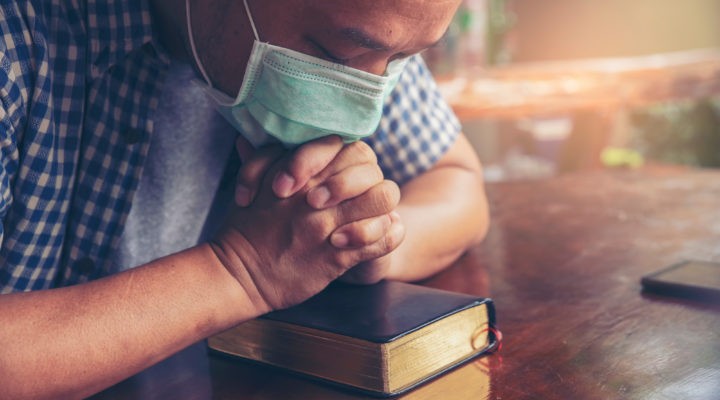“Well, I guess what I’m trying to say is that I’ve been imagining killing myself,” the pastor said.
I was on a Zoom call recently with 10 pastors across three denominations, when one of the participants shared a struggle with suicidal thoughts in these challenging days. By the time the meeting concluded, four of the 10 had found the courage to admit their own suicidal ideations.
 I was the youngest person in the group, so these aren’t young, green pastors. These are veterans who have gone through plenty of difficult things in their time, but today’s intensity and difficulty is unprecedented.
I was the youngest person in the group, so these aren’t young, green pastors. These are veterans who have gone through plenty of difficult things in their time, but today’s intensity and difficulty is unprecedented.
One pastor shared the heartbreaking story of going back to church too early and losing a beloved church member to COVID-19. Another shared how congregants were daily emailing him with threats to leave the church if they didn’t reopen immediately — and withholding their tithes until then.
One pastor was fired. Her husband passed away several years ago, leaving her a single mother of two children. Without child care, she was forced to work from home as best she could. Parenting is a full-time job, and parenting two small children alone during a pandemic stretches the metaphor beyond its breaking point. Her church was unhappy with her leadership, sermon quality and lack of a vision during this time of crisis, so they let her go.
Another pastor was forced to lay off half the church’s staff members because so many of the church’s congregants lost their jobs and are unable to give right now.
I know of another pastor who wasn’t in this meeting who after preaching about race one week, a congregant came to the church office and kicked his office door off of its hinges in an attempt to incite the pastor into a fist fight.
One shared that the survey results the congregation took about whether they should return to in-person worship or not resulted in a nearly perfect 50/50 split, with several members writing in the comments section that they would leave if the church (1) didn’t open immediately or (2) attempted to open at all.
“Leading anxious congregations amidst a pandemic, a hyper-partisan culture, a civil rights movement, and an upcoming election is destroying the lives of our pastors. Literally.”
Leading anxious congregations amidst a pandemic, a hyper-partisan culture, a civil rights movement, and an upcoming election is destroying the lives of our pastors. Literally.
The only thing that surprised me about the confessions made by these four pastors struggling with suicidal ideation was that there were only four admissions. This Zoom call only echoed the reality that I’ve heard other pastor friends across the nation report for months now.
There’s a story in the Old Testament about King Saul being defeated in battle. Instead of waiting on the opposing army to torture and ridicule him before killing him, he chooses to take his own life by falling on his sword.
Well, pastors are already facing ridicule not just from their adversaries but from many of their own congregants. They’re being tortured by their own inability to lead their churches out of a pandemic, out of hyper-partisanship and out of racism.
Falling on their swords is starting to look pretty attractive.
Church always has been a place where people can act foolish with little consequence — where people have the space to act out toward clergy in ways that aren’t safe to do toward their bosses or their spouses. Being a pastor never has been easy, but this is a new level of hell that pastors are living.
If you’re a congregant reading this, here’s some advice:
First, accept the fact that your church is not The Church. The body of Christ here on earth is not Christ himself. Don’t conflate the two. Churches are fallible organizations full of sinners saved by grace.
“Those people who are hellbent on saving the church are ironically the very ones who end up doing her the most harm.”
In my experience, those people who are hellbent on saving the church are ironically the very ones who end up doing her the most harm. The person who chooses to love the church just as she is, for this is what Christ does, is the one who is able to grow with her.
So stop comparing your church to the one down the street or the one your kids go to. Accept your church for who she is.
Second, accept that your pastor is a shepherd, not The Shepherd. If we’re unable to accept that our pastors are human beings with flaws, that says more about us than it does our pastors.
And stop comparing them to the pastor down the street or on the podcast you listen to. It isn’t fair to your pastor, and such comparison incites in us the sin of envy. One of the Ten Commandments teaches us not to covet —and I believe healthy church members will not covet their neighbor’s pastor.
Third, pray for your pastor. Pray for his or her mental health. Pray for the pastor’s family. Pray for the pastor to flourish. Pray for God to give you understanding and patience with your pastor and to show you how to be a source of light and life during this time of death and darkness.
Fourth, for the next six months, commit to staying and being the best church member you can be. I’ve learned that when I get angry emails, I don’t need to respond on the same day. I write a response, then I sleep on it. If I still feel like I need to say those things the next day, then I do. But 90% of the time I don’t, and I craft an entirely new email.
If you don’t like how things are going in your church, that’s OK. No one is saying you should, but I am absolutely suggesting that you keep it to yourself until the pandemic is over and then, if you still think it’s worth addressing, do so at that time.
It’s common for church members to smile to themselves when their pastor does something they like but never reach out with a compliment — and then be quick to speak out when the pastor does something they don’t like. That means the only time we hear from some of you is when you are unhappy. It’s exhausting, and isn’t an honest representation of who you are or your relationship with the church and your pastor. Share the good things, and share them often.
Practice the Christian virtue of being long-suffering, and ride this storm out. Be committed to your church. Be committed to its financial and spiritual success.
Fifth, advocate for you pastor’s mental health. Ask committees to use emergency funds to pay for your pastor to see a counselor, get a spiritual director or even just get out of town for a bit. Assure your pastor that if she or he needs to take a leave of absence or an extended vacation, they are empowered to do so. Their lives may depend on it.
If you’re a pastor reading this, I have advice for you too:
First, get a counselor. Find a professional outside of your congregation whom you can get real with, and then be brutally honest with that counselor.
Second, be honest with your primary care physician about anxiety and depression. You made need to see a psychiatrist, but odds are that your PCP is dealing with a lot of mental health issues right now and may have some wonderful advice for you. And you made need medication in the short term. It’s worth it. Your life may be at stake.
“We are in a pandemic. Reevaluate and recreate realistic expectations.”
Third, do less. Being a pastor right now is killing pastors. That isn’t hyperbole or a metaphor. The workload and the mental strain are inhumane and unsustainable. We are in a pandemic. Reevaluate and recreate realistic expectations.
Some things can be delegated to other staff, deacons, committees or lay teams. Other things will need to be dropped for a time. Hopefully your church will understand if you communicate your needs to them, but even if they don’t, losing your job is better than losing your life.
Fourth, practice friendship. One of the worst things about the pandemic is the isolation. We are in this together, but we are doing it separately. Reach out to your friends and put a weekly or monthly Zoom date on the calendar. Have a drink, cuss, play video games or anything else that brings even a modicum of relief to the internal pressure you’re carrying.
Community and intimacy are prescriptions for the spiritual disease of isolation, and you probably cannot get your prescription filled in your congregation right now.
Fifth, lean on your peers. No one can support a pastor quite like another pastor. Ask a few trusted peers to be in a small peer group that carries each other’s pandemic burdens for the next six months. And then tell them the truth, pray for each other fervently and often, and hold each other accountable for their taking care of mental health. When my other pastor friends ask me if I’ve made an appointment with my counselor yet, then I feel compelled to do so in a way that I don’t otherwise feel.
You may think you don’t have any more room to carry anyone else’s burden, and that’s true, but I’d wager you will find the burden is actually lessened when shared with competent companions who are on the same journey.
Jakob Topper serves as pastor of NorthHaven Baptist Church in Norman, Okla.
Related articles:


